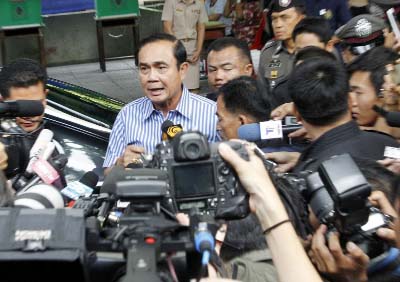
Agencies, Bangkok :
Polls close in vote on charter that generals claim will bring stability but critics say is meant to cement army’s hold.
Polls have closed in a referendum across Thailand on a controversial new constitution that has been been drafted by the military-led government.
The military says the constitution – Thailand’s 20th since absolute monarchy was abolished in the 1930s – will curb political corruption, bring stability and heal more than a decade of bitter political division.
But critics say it is intended to tighten the military’s grip on democracy.
Polls opened at 8am local time (01:00 GMT) on Sunday, offering Thais the first chance to vote since powerful Thai generals toppled a democratically elected government in 2014.
If people vote to accept the military-approved constitution, opponents say, it will cement the role of the armed forces in Thailand politics for decades, and constrain the populist forces that have arisen in recent times to challenge the generals and their allies in the royalist establishment.
“There is great anticipation and excitement here in Thailand because we haven’t had a say for so long,” Thitinan Pongsudhirak, director of the Institute of Security and International Studies at Chulalongkorn University, told Al Jazeera.
“This draft constitution is highly consequential about how things are going to be in Thailand in the coming months and years.”
Despite the importance of the referendum, public debate has been muted.
Many have yet to see a copy of the draft constitution, while the military government has effectively banned campaigning against the document; they have arrested and detained dozens of activists and politicians in the run-up to the referendum, some of them trying to hand out leaflets urging people to vote “no”.
“A public referendum is supposed to be a democratic tool, but in Thailand it has a very different look,” said Al Jazeera’s Wayne Hay, reporting from Bangkok.
“When opponents of the military coup tried to open centres to monitor possible cheating before the vote, they were shut down within minutes,” he said.
In the run-up to the vote, the referendum law allowed for a 10-year prison sentence for those found guilty of “rude” or “false” discussion about the draft constitution.
Such restrictions did not apply to the “yes” vote, and the military government broadcast songs and television programmes to drum up support for a positive result in the referendum.
Polls close in vote on charter that generals claim will bring stability but critics say is meant to cement army’s hold.
Polls have closed in a referendum across Thailand on a controversial new constitution that has been been drafted by the military-led government.
The military says the constitution – Thailand’s 20th since absolute monarchy was abolished in the 1930s – will curb political corruption, bring stability and heal more than a decade of bitter political division.
But critics say it is intended to tighten the military’s grip on democracy.
Polls opened at 8am local time (01:00 GMT) on Sunday, offering Thais the first chance to vote since powerful Thai generals toppled a democratically elected government in 2014.
If people vote to accept the military-approved constitution, opponents say, it will cement the role of the armed forces in Thailand politics for decades, and constrain the populist forces that have arisen in recent times to challenge the generals and their allies in the royalist establishment.
“There is great anticipation and excitement here in Thailand because we haven’t had a say for so long,” Thitinan Pongsudhirak, director of the Institute of Security and International Studies at Chulalongkorn University, told Al Jazeera.
“This draft constitution is highly consequential about how things are going to be in Thailand in the coming months and years.”
Despite the importance of the referendum, public debate has been muted.
Many have yet to see a copy of the draft constitution, while the military government has effectively banned campaigning against the document; they have arrested and detained dozens of activists and politicians in the run-up to the referendum, some of them trying to hand out leaflets urging people to vote “no”.
“A public referendum is supposed to be a democratic tool, but in Thailand it has a very different look,” said Al Jazeera’s Wayne Hay, reporting from Bangkok.
“When opponents of the military coup tried to open centres to monitor possible cheating before the vote, they were shut down within minutes,” he said.
In the run-up to the vote, the referendum law allowed for a 10-year prison sentence for those found guilty of “rude” or “false” discussion about the draft constitution.
Such restrictions did not apply to the “yes” vote, and the military government broadcast songs and television programmes to drum up support for a positive result in the referendum.

